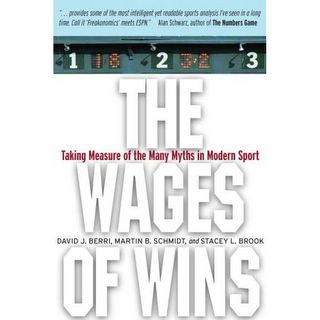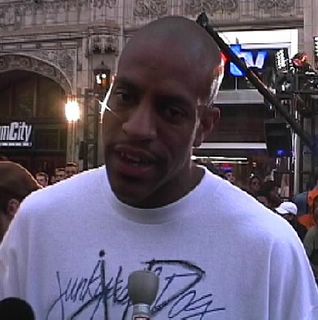Book Bashing
Months ago, I railed against a basketball book by Harvey Araton after reading only its introduction. I'm going to go one step further now and argue against a book without even reading it. The book is "The Wages of Wins" by three economists, David J. Berri, Martin B. Schmidt, and Stacey L. Brook.
While I haven't read the book, I did at least read this review of it in The New Yorker. The authors claim to have come up with an algorithm that weighs players positive and negative statistics like points scored, shooting percentage, assists, turnovers, rebounds in such a way to determine how many wins a player is worth to his team in a season. They call it a Win Score.
And according to the article, Allen Iverson has a pretty lousy win score and his former Georgetown teammate, Jerome "Junkyard Dog" Williams, is "among the strongest players of his generation." If that doesn't raise a giant red flag in your mind, you have never watched an NBA game.
The authors of "The Wages of Wins" argue that NBA talent evaluators overvalue scoring when they look at players. Only an objective, mathematical formula that ignores the artistry in Iverson's game and focuses on his bottom line impact on his team's record can tell us how good he is, according to the book.
I think the author's are mistaken. You can't win basketball games without scoring points. It's a lot harder to find players like Iverson, who can average 30 points over a whole season, than it is to find role players like Williams, who rebound, set screens and play defense.
The New Yorker review doesn't contain details on the authors' methodology or exactly which statistics are weighed in their algorithm or how. I wish it did. But I'm guessing they aren't able to take into account factors pertaining to players' roles on their teams. Iverson turns the ball over a lot and shoots a pretty poor percentage, but that's because he always has the ball in his hands and the teams usually built around him need him to shoot a lot. And as the team's main guy, the task of getting up a shot -- even a difficult or forced one -- on broken possessions with the shot clock running down always falls to Iverson. Jerome Williams' teams never ask him to make low-percentage or risky plays. His job is certainly difficult and he did it well throughout his career, but he just doesn't have as much responsibility on the court as Iverson does. Unless the authors of "The Wages of Wins" have somehow accounted for all these seemingly unquantifiable ways in which players differ, it's hard to take their Win Scores seriously.
It's surprising to see the reviewer, Malcolm Gladwell, buy into the authors' argument so wholeheartedly. One of the major themes of Gladwell's bestseller "Blink" was that snap judgments made by experts often trump even the best formulas. But he ends the review by emphasizing the "reality" that "the Philadelphia 76ers would be better off" without Iverson and quoting the book, which says: "One can both play and watch basketball for a thousand years. If you do not systematically track what the players do, and then uncover the statistical relationship between these actions and wins, you will never know why teams win and why they lose.”
How is this different from the chapter in "Blink" where Gladwell goes on endlessly about a musician who'll never succeed according to music industry measurement tools but who is touted by all the experts like Limp Bizkit frontman Fred Durst who know good music when they hear it. (On second thought, maybe using Durst's recommendation to prove a musician's worth is the equivalent in spuriousness of displaying the power of the Win Score with Jerome Williams.)
The authors of "The Wages of Wins" may be right, or at least partially right. But there's no reason to accept their arguments until someone assembles an NBA team based on the players' Win Scores rather than how good they appear to be. If a starting five of Howard Eisley, Devin Brown, Jerome Williams, Antonio Davis and Jason Collins can win an NBA title, I'll bow to infinite wisdom of the number crunchers.
|
This book does not get the same robust recommendation as Da Jesus Book. |
While I haven't read the book, I did at least read this review of it in The New Yorker. The authors claim to have come up with an algorithm that weighs players positive and negative statistics like points scored, shooting percentage, assists, turnovers, rebounds in such a way to determine how many wins a player is worth to his team in a season. They call it a Win Score.
And according to the article, Allen Iverson has a pretty lousy win score and his former Georgetown teammate, Jerome "Junkyard Dog" Williams, is "among the strongest players of his generation." If that doesn't raise a giant red flag in your mind, you have never watched an NBA game.
The authors of "The Wages of Wins" argue that NBA talent evaluators overvalue scoring when they look at players. Only an objective, mathematical formula that ignores the artistry in Iverson's game and focuses on his bottom line impact on his team's record can tell us how good he is, according to the book.
I think the author's are mistaken. You can't win basketball games without scoring points. It's a lot harder to find players like Iverson, who can average 30 points over a whole season, than it is to find role players like Williams, who rebound, set screens and play defense.
|
One of the best players of his generation, according to The Wages of Wins, The Junkyard Dog could use some work from the best orthodontist of his generation. |
The New Yorker review doesn't contain details on the authors' methodology or exactly which statistics are weighed in their algorithm or how. I wish it did. But I'm guessing they aren't able to take into account factors pertaining to players' roles on their teams. Iverson turns the ball over a lot and shoots a pretty poor percentage, but that's because he always has the ball in his hands and the teams usually built around him need him to shoot a lot. And as the team's main guy, the task of getting up a shot -- even a difficult or forced one -- on broken possessions with the shot clock running down always falls to Iverson. Jerome Williams' teams never ask him to make low-percentage or risky plays. His job is certainly difficult and he did it well throughout his career, but he just doesn't have as much responsibility on the court as Iverson does. Unless the authors of "The Wages of Wins" have somehow accounted for all these seemingly unquantifiable ways in which players differ, it's hard to take their Win Scores seriously.
It's surprising to see the reviewer, Malcolm Gladwell, buy into the authors' argument so wholeheartedly. One of the major themes of Gladwell's bestseller "Blink" was that snap judgments made by experts often trump even the best formulas. But he ends the review by emphasizing the "reality" that "the Philadelphia 76ers would be better off" without Iverson and quoting the book, which says: "One can both play and watch basketball for a thousand years. If you do not systematically track what the players do, and then uncover the statistical relationship between these actions and wins, you will never know why teams win and why they lose.”
How is this different from the chapter in "Blink" where Gladwell goes on endlessly about a musician who'll never succeed according to music industry measurement tools but who is touted by all the experts like Limp Bizkit frontman Fred Durst who know good music when they hear it. (On second thought, maybe using Durst's recommendation to prove a musician's worth is the equivalent in spuriousness of displaying the power of the Win Score with Jerome Williams.)
The authors of "The Wages of Wins" may be right, or at least partially right. But there's no reason to accept their arguments until someone assembles an NBA team based on the players' Win Scores rather than how good they appear to be. If a starting five of Howard Eisley, Devin Brown, Jerome Williams, Antonio Davis and Jason Collins can win an NBA title, I'll bow to infinite wisdom of the number crunchers.




3 Comments:
Just stumbled upon your blog because I just went to Bicol. How the hell did you find out about our Filipino basketball madness? Not that I mind, but it's just such an interesting subject and am just glad someone discovered it.
Hi, Rafe--
Kind of a weird way to get in touch with you, but I couldn't find an e-mail address. I work at Medill, and we saw the recent story in the Chronicle about you and were so impressed! Would you be interested in letting fellow alumni know what you're up to in the class notes section of our quarterly newsletter, Medill magazine?
Unfortunately, I couldn't find you in our alumni database, so I need to confirm your full name and year of graduation and degree. Also, let me know if there are any other details you'd like to share.
You can send a response to the general Medill notes e-mail, medillnotes@gmail.com
Congrats on your scholarship, we look forward to hearing from you!
Cheers,
Sarah Dahlberg
Stats--these authors are just trying to do what the James guy did 20 years ago for baseball--try to quantify production/success, and then use it to predict winners.
They always miss the chemistry and the talent part. And in basketball, as you imply, style can lead to winning as well. By the way, do the Filippinos have a "style" that is a signature of the game in their country?
Post a Comment
<< Home